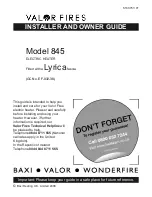
10
103911
TROUBLE-
SHOOTING
Check voltage to electrical out-
let. If voltage is good, check
heater power cord for breaks.
Adjust motor/fan guard to keep
fan from hitting inside of heater
shell. Bend fan guard if neces-
sary.
Replace fan. See Fan, page 12.
Replace motor. See Motor,
page 11.
Repeat installation and opera-
tion instructions. See Installa-
tion, page 6 and Operation,
page 7.
A) Check ignitor wire. Tighten
or reattach loose ignitor wire.
See Figure 13, page 13 for igni-
tor wire location.
B) Set gap between ignitor
electrode and target plate to
.17" (4.3 mm).
C) Tighten nut holding piezo
ignitor to base of heater.
D) Replace ignitor electrode.
See Ignitor, page 13.
This can happen when running
heater in temperatures above
85°F (29°C). Run heater in
cooler temperatures.
Check heater inlet and outlet.
Remove any obstructions.
Replace fan. See Fan, page 12.
Clean heater. See Mainte-
nance, page 9.
!
WARNING
Use only in areas free of
high dust content.
No electrical power
to heater
Fan hitting inside of
heater shell
Fan blades bent
Defective motor
User did not follow instal-
lation or operation in-
structions properly
No spark at ignitor. To
test for spark, follow step
9 under Ignitor, page 13.
If you see spark at ignitor,
have heater serviced by
qualified service person.
If no spark seen:
A) Loose or disconnected
ignitor wire
B) Wrong spark gap
C) Piezo ignitor loose
D) Bad ignitor electrode
High surrounding air tem-
perature causing thermal
limit device to shut down
heater.
Restricted air flow
Damaged fan
Excessive dust or debris
in surrounding area
Fan does not turn
when heater is
plugged in.
Heater will not
ignite.
Heater shuts down
while running.
OBSERVED FAULT POSSIBLE CAUSE
REMEDY
!
WARNING
Never service heater while it is plugged in, connected to
propane supply, operating, or hot. Severe burns and
electrical shock can occur.











































